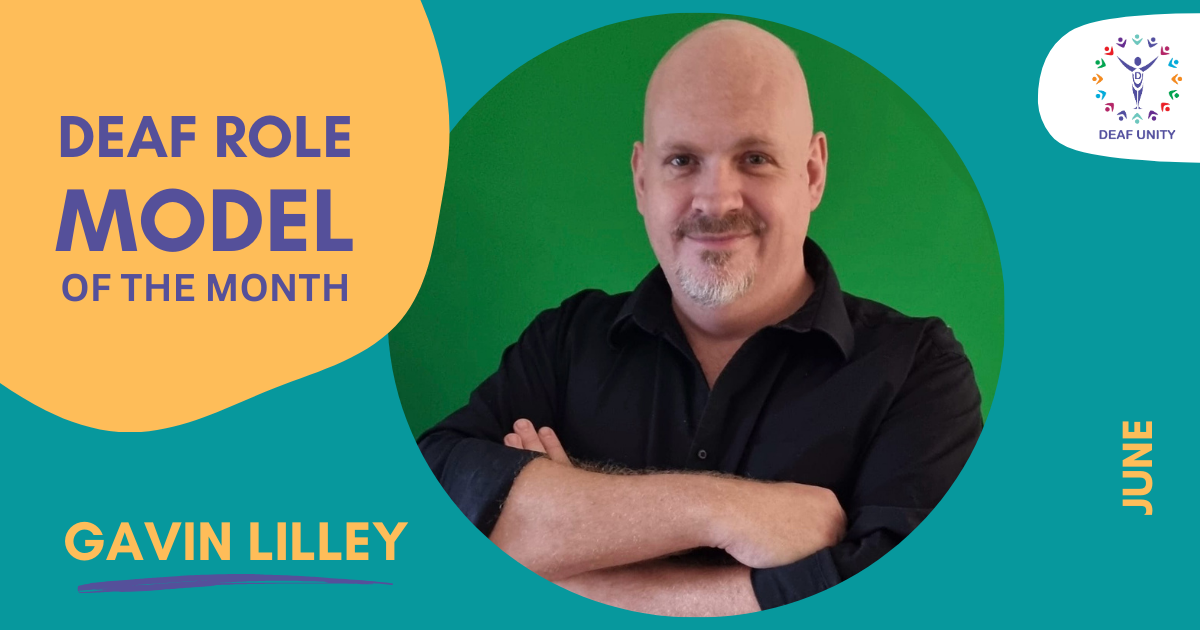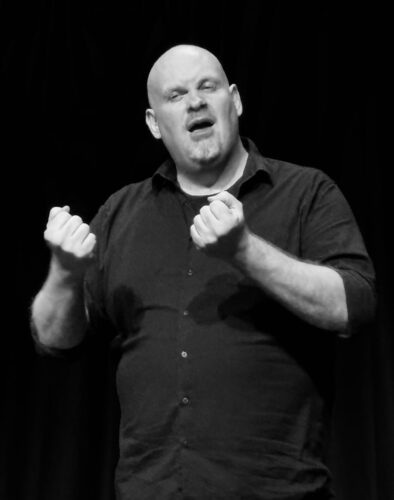
Each month we invite an inspirational or outstanding deaf role model to share their story. This can be from what they’ve learnt, to what they wish they’d have known as well as their best deaf tips.
Our role model this month is Gavin Lilley. Gavin is a renowned deaf stand-up comedian, British Sign Language translator, assessor and consultant. You can watch his full interview in BSL or read the English transcript below.
Please tell us a little about yourself? (career, family, achievements etc.)
I was born in Ilford in East London. My parents are deaf, and I have two sisters who are both hearing. I went to Mary Hare school, and I went to college in East London. I did some work in media, and I then went to Preston to UCLAN where I did a degree in Deaf Studies. I graduated and then lived in lots of different places all over the UK. My fiancée is from Estonia, and we have three children, who are 9, 7 and 5. My daughter is hearing, and my two sons are deaf. My fiancée is also deaf and so is her family. I now live in West Yorkshire and I’m very happy there.
Did you grow up in the Deaf Community or come to it later in life?
I grew up in the Deaf Community and my family is deaf, so I was immersed in the Deaf Community and going to Deaf club from day one.
What was your experience of education and higher education as a deaf person?
I have good memories of being at Mary Hare as it was a great place to make friends. The school’s policy had a focus on oralism and that was quite difficult for me, especially coming from a family who used sign language to communicate. We weren’t allowed to sign at Mary Hare and were punished if we did. We had to use spoken English. So, it was a bit confusing as I was signing at home and then would get to school and have to switch my language and mode of communication. That became very frustrating, and that frustration was really born of language oppression. This oppression was the reason I decided to not stay for sixth form at Mary Hare and moved to Redbridge College in East London which was local to me. I had a Communication Support Worker with me in the classroom to interpret and it went well. I was the only deaf student there, so I didn’t really communicate or socialise with the other students which made me feel a little bit apart from everything and a bit singled out as being the one ‘deaf student’ in the student group.
After college I decided to go to University in Preston as I knew a lot of deaf people went there and there as a strong Deaf Community. I did Deaf Studies, and it was a real change as I could communicate freely with everyone and had that connection and rapport with the group. I learnt so much about language, culture, community and history while I was there. It was a brilliant group and a really fantastic time in my life.
You have a variety of skills and talents, from comedy to translation. What did you first get into and how did your career develop from there?
Regarding my translation skills I was actually very lucky as when I was growing up my parents encouraged me to read lots. This enabled me to understand both English and BSL and become bilingual. Over time this naturally led to me undertaking translation work. I had to really understand the role, the ethics and the specificities of how translation works. I finally got my qualification recently. Even though I had been working and training for a long time I had delayed doing the course to officially qualify, but I now have the coveted yellow card!
Regarding humour, I had been a BSL teacher and Assessor for many years and had always used comedy to make everything a bit more fun. At school I was known as the class clown and my family loves to joke and tease around so humour has always been a big part of my character. I never thought I would do stand-up though. I always loved watching hearing comedians on the t.v. I must have been inspired by that, as St John’s Deaf club in Green Lane had a variety show where I did some jokes and I did well, and then everything seemed to snowball from there. There was no plan, it just seemed to happen which was amazing. Looking back, it all seems quite weird and surreal!
What has been the highlight of your career up to now?
One of the best things in my career so far was being able to set up the Stand-up Extravaganza events and working with groups of deaf people who want to get into comedy. I aim to try to help them hone their skills and get more deaf people into stand up and hopefully see them go on developing and becoming successful. It’s an amazing feeling to see them benefit from the opportunities that I was never given myself. I had to just get on with it really without any support or encouragement, so it’s nice to be able to give that to them.
On a personal level doing a comedy gig at the London Palladium as a support act for John Bishop’s tour was an amazing experience. Standing on that stage in a three-tiered theatre in front of 2500 people was just electrifying. I couldn’t believe I was the first deaf person to have ever performed comedy there. That is something I will truly never forget.

Did you face any particular barriers getting to where you are and what advice would you give to those wanting to follow the same path?
I’ve mentioned it before but it’s important to have a good support system around you, having a mentor can be very useful. If people want to follow the same pathway as me, then I think it’s a case of believing in yourself. It’s difficult to explain but you must go out and get the experience. If you believe in yourself and work hard you will get there!
You set up a BSL Watchdog page, why is it important to protect the language and how can we all ensure we continue to do so?
BSL Watchdog is a page that I set up and run with a group of other people. The aim of the page is really to preserve the standard and value of BSL. Our language isn’t a cute novelty, it’s a way of life. We want it to be taught properly. The original aim was to make sure that BSL is being taught correctly. As this is quite a debated topic where emotions can run high there were a few heated discussions and arguments, but this wasn’t the aim of the group. We really want to keep things civil and have open discussions where we can support the people who want to teach BSL properly. We have qualified people who have the experience and knowledge of teaching BSL correctly and they can then be there to help develop the people who are looking for support.
What changes do you hope to see within the world of comedy, translation, BSL learning and for the deaf community in the next 10 years?
I hope to see large amounts of growth in these areas in the future with them all gaining ever increasing success and prominence.
Who inspires you and why? (In the deaf community or otherwise)
There have been a lot of people who have inspired me along the way. Having John Bishop being my mentor in the world of hearing comedy has been amazing. He is someone I look up to and I have learnt a lot from him. Paul Smith and Michael McIntyre are two comedians who always make me laugh. Really there have been so many people who have inspired me on my journey.
What ways do you think hearing people can be allies to the deaf community? Any DOs and DON’Ts?
If hearing people want to support the Deaf Community, I would say it is important to work ‘with us’ and not ‘for us’. We need to move away from the idea of being ‘helped’. It is about working together. It is also important to make sure things are being led by deaf people. It is only deaf people who have the experience of what it means to live life as a deaf person and the issues they are dealing with. To be able to support them you need to listen to them.
3 top tips for deaf people? (e.g. everyday life/learning/communicating/ socialising/travelling etc.)
My top tips are to believe in yourself and don’t feel that you are less than any hearing person. You are on an equal footing and must value yourself. Your thoughts and feelings are just as important as everyone else’s.
To read more inspirational role model interviews, take a look here. If you would like to be an ally to the deaf community and learn sign language, check out our courses here.
Looking for more support? We’ve made it our mission to improve the lives of deaf people everywhere. Check out Deaf Unity’s projects to find out what we can do for you. If you’d like to get in touch, contact us here.

